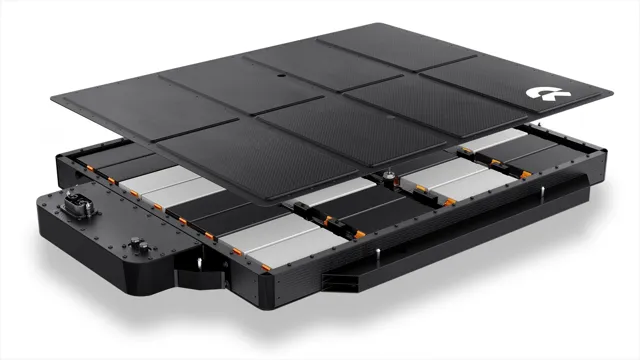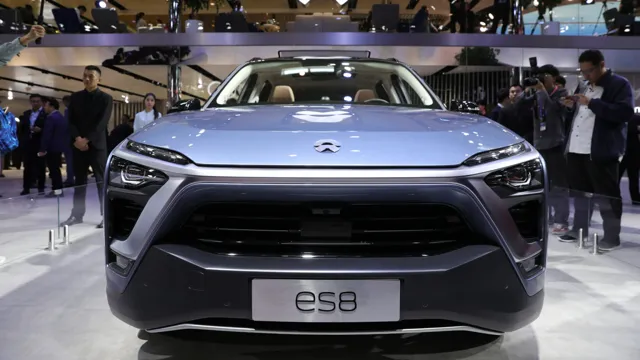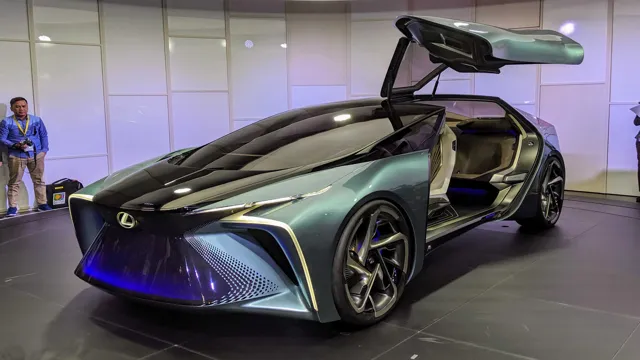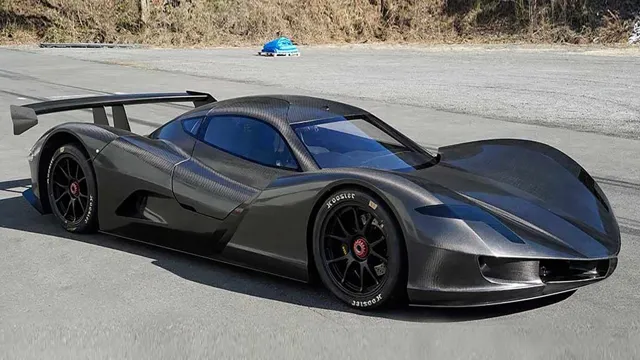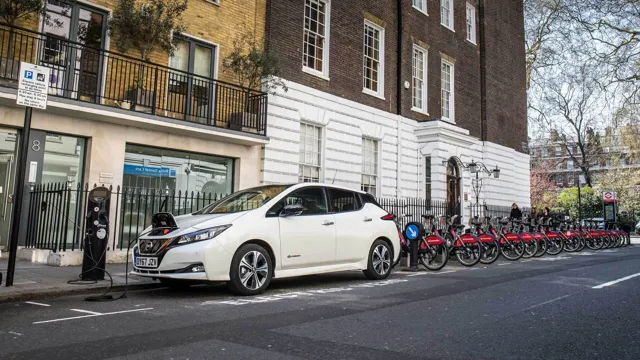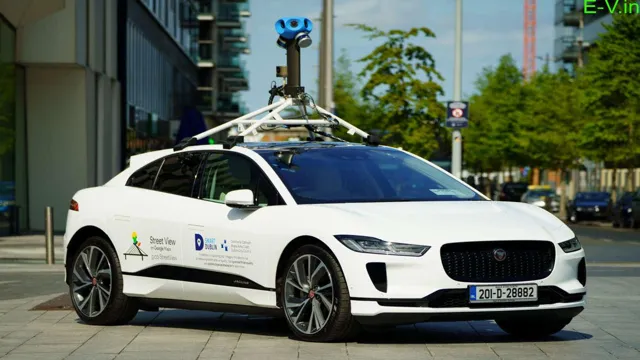Revolutionizing Mobility: The Latest Electric Car Battery Tech News You Need to Know
Electric cars have come a long way since their inception, and one of the biggest leaps forward has been in battery technology. As more and more people are looking for alternative modes of transportation, companies are racing to produce electric vehicles with longer ranges and faster recharge times. The latest electric car battery innovations are making this possible, with new materials and manufacturing techniques allowing for smaller, lighter, and more powerful batteries.
From solid state batteries to silicon anodes, there are a variety of exciting developments happening in the world of electric car batteries. These innovations have the potential to revolutionize the way we think about transportation, and help reduce our dependence on fossil fuels. But what exactly are these new technologies, and how do they work? In this article, we’ll explore the latest electric car battery innovations and what they mean for the future of sustainable transportation.
We’ll dive into the science behind these new technologies and how they’re being developed, as well as the potential benefits and limitations of each. Whether you’re a die-hard EV enthusiast or simply curious about the latest advancements in clean energy, this article will provide an engaging and informative overview of what’s on the horizon for electric cars.
Increased Efficiency
With advancements in electric car battery technology, we are seeing a significant increase in efficiency. Traditional lead-acid batteries are being replaced by lithium-ion batteries, which are more energy-dense and have a longer lifespan. In addition, new battery management systems are being developed that better regulate the charging and discharging of batteries, optimizing their performance and prolonging their life.
There has also been a push towards developing solid-state batteries, which would eliminate the need for the liquid electrolyte found in traditional lithium-ion batteries, making them safer and more efficient. These technological developments are contributing to increased range and faster charging times for electric vehicles, making them a more practical and sustainable option for drivers. As the demand for electric cars continues to grow, battery technology will continue to improve, making them an even more viable and efficient transportation option.
It’s exciting to see electric car battery tech news unfold, and I can’t wait to see what the future holds.
Solid-state Batteries Show Promise
Solid-state batteries are a new technology that promises to revolutionize the world of energy storage. Unlike traditional lithium-ion batteries, which use liquid electrolytes, solid-state batteries use solid electrolytes, which have the potential to increase efficiency and improve safety. One of the most significant advantages of solid-state batteries is their ability to store more energy in a smaller space.
This means that devices such as smartphones, electric cars, and laptops could become smaller and lighter while still having a longer battery life. Solid-state batteries also have faster charging times and a longer lifespan than traditional batteries, making them an attractive option for both consumers and manufacturers. With the potential to transform the energy industry, it’s no wonder that solid-state batteries are receiving so much attention from researchers and investors alike!
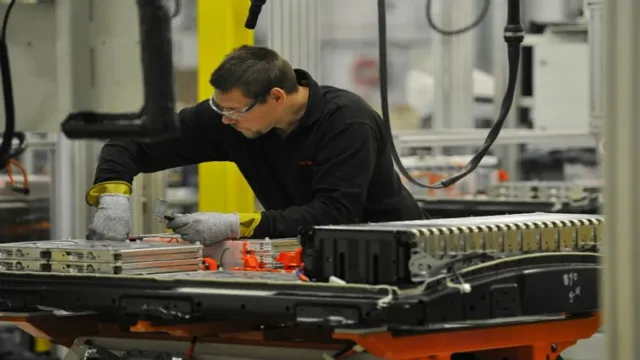
Li-S Batteries May Replace Li-Ion
Li-S batteries are the latest development in battery technology and may replace Li-ion batteries altogether. One of the biggest advantages of Li-S batteries is their efficiency, as they offer a higher energy density than Li-ion batteries. This means that they can store more energy in a smaller space, making them ideal for use in portable devices, electric vehicles, and even for grid storage.
In addition, Li-S batteries are not dependent on rare earth elements, which are becoming increasingly scarce and expensive. This makes them a more sustainable and cost-effective alternative to Li-ion batteries. With the increased efficiency of Li-S batteries, we may be looking at a revolution in battery technology that could change the way we power our world.
Extended Range
Electric car battery tech news continues to evolve, and one of the latest developments is focused on extended range. With automakers seeking to make electric cars a more attractive option for consumers, battery technology has become a major focus. By extending the range of electric cars, drivers can enjoy longer trips without worrying about running out of power.
This has led to the development of more advanced battery systems, including solid-state batteries and lithium-sulfur batteries. These new technologies are designed to offer improved energy density, faster charging times, and longer lifetimes. With electric cars becoming more popular than ever, the race to develop better and more efficient battery technology is heating up.
As a result, we can expect to see more exciting developments in this area in the years to come.
Tesla’s Breakthrough Battery Design
Tesla’s new battery design promises an extended range that could significantly upgrade the performance of electric vehicles. The new battery technology is expected to provide a range improvement by nearly five times compared to the existing batteries. This is an exciting breakthrough for the industry as it could make EVs more competitive with traditional gasoline vehicles in terms of mileage.
Tesla’s new batteries rely on a combination of electrolyte and silicon anode- which replaces the graphite anode. Tesla’s Battery Day announcement featured a long-lasting, high-performing – cost-cutting unit that could revolutionize the market. The company’s plan to reduce the price of batteries will enable vehicles that cost less than $25,000, paving the way for electric vehicles to become much more accessible to consumers.
The new battery design’s success will determine the future of the electric vehicle market, and it is looking very promising.
Volkswagen’s Plan for Solid-state Batteries
Volkswagen recently announced its plan to develop solid-state batteries that would potentially extend the driving range of its electric vehicles. Unlike the current lithium-ion batteries, solid-state batteries use a solid electrolyte instead of a liquid one, which could potentially reduce the risk of fire and increase the energy density of the battery. Even though the technology is still in its early stages, VW is optimistic about its potential application in electric vehicles, which could lead to a range of up to 700km per charge.
This could be a game-changer for EVs, as it would significantly reduce “range anxiety” for drivers and make long-distance trips more feasible. However, there are still many technical challenges that need to be addressed before solid-state batteries can be widely used in EVs, including cost, durability, and scalability. Volkswagen’s commitment to solid-state battery technology is an exciting development that could revolutionize the electric vehicle industry and pave the way for a cleaner, more sustainable future.
Audi’s Partnership with Samsung SDI for Higher-density Batteries
Audi has recently joined forces with Samsung SDI to develop high-density batteries that will extend the range of their electric vehicles. These new batteries are said to have a higher energy density and a longer life cycle than their predecessors, which means that Audi’s upcoming electric models will have a longer driving range. This is great news for those who are looking to make the switch to an electric vehicle, but have hesitated due to limited range capabilities.
With this new partnership, Audi aims to make its electric vehicles more competitive in the market and to encourage more people to consider making the switch to eco-friendly driving. With the new batteries, drivers will be able to enjoy a reliable and efficient driving experience, without sacrificing range or power. It’s an exciting time for the electric vehicle industry and we can’t wait to see what Audi and Samsung SDI will bring to the table.
Cost Reduction
Electric car battery technology has been improving at an exponential rate, and the latest news is that the cost of production is expected to drop significantly in the near future. This is great news for both manufacturers and consumers, as it means that electric vehicles will become more affordable and therefore more accessible to a wider range of people. The drop in production costs is thanks in part to advancements in technology, but also due to economies of scale as more and more electric cars are produced.
As a result, we can expect to see many more affordable electric cars on the market in the coming years, making it easier for people to make the switch from traditional gasoline vehicles. Despite this cost reduction, however, the quality and performance of electric car batteries continues to improve, ensuring that electric cars remain an attractive option for environmentally-conscious consumers.
Ford and Volkswagen’s Joint Battery Venture
Ford and Volkswagen are planning to join forces on a new battery venture in a bid to reduce manufacturing costs and improve the efficiency of electric vehicles. The collaboration is a mutually beneficial move that will allow both car giants to share resources and develop a more sustainable future together. By sharing expertise and combining technologies, the joint venture aims to improve battery technology and reduce production costs.
Ford and Volkswagen plan to set up dedicated production facilities across Europe to ensure the timely delivery of high-quality batteries to their customers. This collaboration is part of a larger effort in the automotive industry to address the issue of increasing battery costs and reduce the environmental impact of electric vehicle production. With this joint venture, we can expect to see a significant impact on the automotive industry, as both companies work together to develop more efficient, cheaper batteries that can make electric cars more accessible and sustainable for everyone.
Cheaper Materials Used in Batteries
Cost Reduction One of the biggest challenges facing the widespread adoption of electric vehicles (EVs) is the cost of batteries. Fortunately, research and development in battery technology have allowed for the use of cheaper materials in battery production. By reducing the cost of batteries, the overall cost of EVs will decrease, making them more affordable to consumers.
For example, scientific breakthroughs in lithium-ion batteries have allowed for the use of less expensive materials, such as iron or manganese, instead of cobalt. This not only reduces the cost but also increases the sustainability of the batteries since cobalt is often associated with unethical mining practices. Additionally, researchers are exploring other materials such as sodium-ion and magnesium-ion batteries that are abundant and readily available, which can further reduce costs.
By utilizing these materials, manufacturers can produce long-lasting, affordable batteries that will help accelerate the shift towards electric mobility and a more sustainable future.
Environmental Impact
Electric car battery technology has come a long way, and news surrounding advancements in this field has never been more exciting. However, with the rise of electric cars, the question of environmental impact arises. While electric vehicles are emissions-free on the road, the production of their batteries has a significant impact on the environment.
Some of the materials used in making batteries, such as lithium and cobalt, are obtained through mining processes that can harm ecosystems. Fortunately, there is growing interest in finding more sustainable alternatives and reducing the carbon footprint of battery production. In fact, some companies are already exploring the use of recycled materials and alternative battery chemistries that are less harmful to the environment.
Through these developments, we can hope for a future where electric cars not only provide a cleaner mode of transportation but also contribute to a healthier planet.
Recycling and Reusing Lithium-ion Batteries
Lithium-ion batteries are widely used in our daily lives, powering everything from our smartphones to electric cars. However, once these batteries reach the end of their useful life, they can pose a significant environmental threat if not disposed of properly. Recycling and reusing lithium-ion batteries can help to mitigate these risks and reduce the overall environmental impact.
This is important because if we simply throw away these batteries, they can leak harmful chemicals into the environment, which can cause soil and water pollution. By recycling and reusing them, we can recover valuable materials such as lithium, cobalt, and nickel, which can be used to manufacture new batteries. In this way, we can reduce the overall demand for raw materials and reduce greenhouse gas emissions associated with the production of new batteries.
Additionally, reusing lithium-ion batteries in applications such as energy storage for renewable energy sources can help to further reduce our reliance on fossil fuels. Overall, recycling and reusing lithium-ion batteries is an important step towards a more sustainable future.
Conclusion
After all this buzz about electric car battery technology, one thing is for sure – the future is electric! With advancements in battery technology, we’re seeing increased range, faster charging times, and overall improved efficiency of electric vehicles. It’s time to say goodbye to gas guzzlers and hello to a world of sustainable transportation. The only downside? We’ll have to find a new excuse for being late to work – we can no longer blame it on running out of gas!”
FAQs
What is the latest news in electric car battery technology?
The latest news in electric car battery technology includes the development of solid-state batteries, which promise higher energy density and faster charging times.
How do electric car batteries differ from traditional car batteries?
Electric car batteries are typically lithium-ion batteries that are rechargeable and designed to provide power to the electric motor. Traditional car batteries are lead-acid batteries that provide power for starting the engine and running the vehicle’s electrical systems.
How long do electric car batteries last?
The lifespan of an electric car battery can vary depending on several factors, including the manufacturer, usage patterns, temperature and climate conditions, and maintenance. Most electric car batteries are designed to last for at least 100,000 miles, but some newer models have batteries that can last for 200,000 miles or more.
What are some of the challenges facing electric car battery technology?
Some of the challenges facing electric car battery technology include high cost, limited range, charging time, and battery degradation over time. Researchers and manufacturers are working to address these issues through the development of new battery chemistries, faster charging methods, and more efficient battery management systems.

